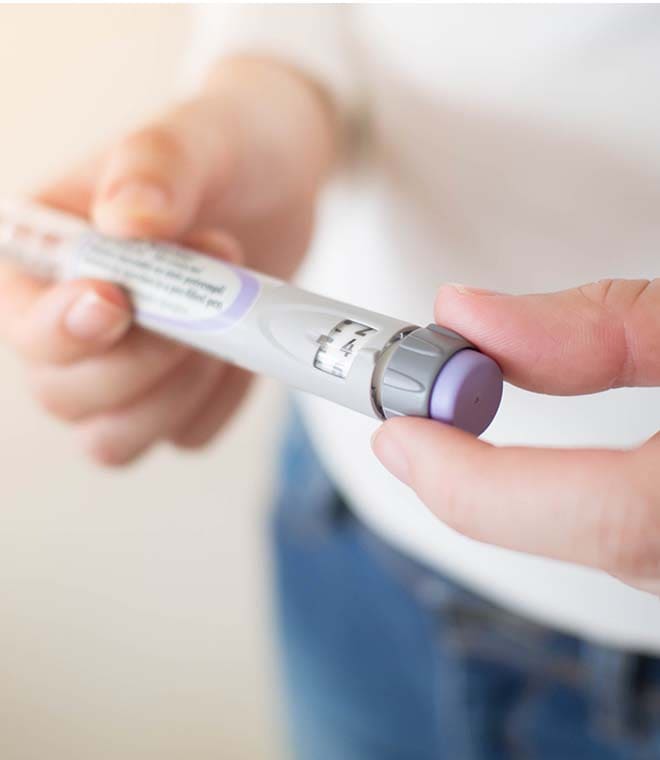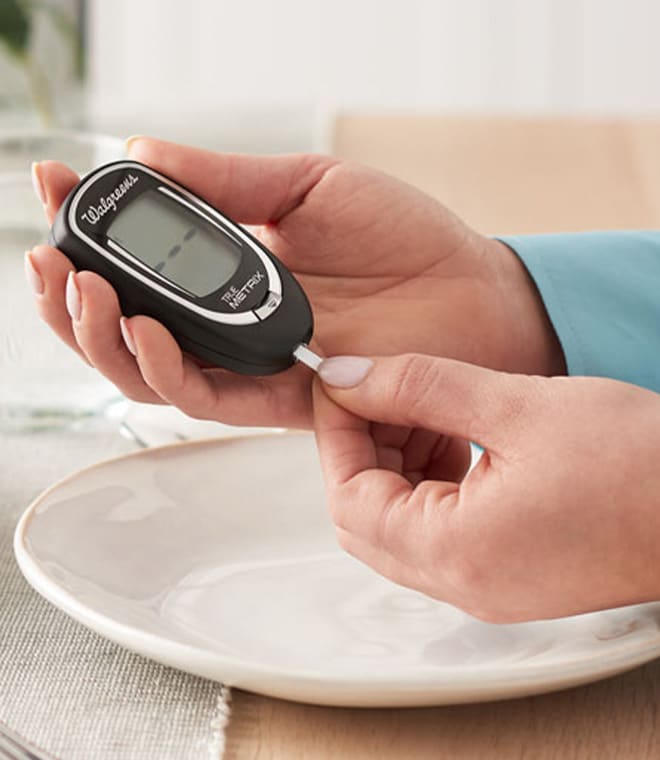Health
Diabetes medicine: Insulin, oral and injectables
By Jenilee Matz, MPH May 21, 2024 • 8 min
For some people with diabetes, a healthy diet, regular exercise and weight loss are all that are needed to keep blood sugar levels in check. Others will also need to take medication to manage their diabetes. Keeping blood sugar levels within the target range you set with your provider is key to preventing dangerous diabetes complications.
How medication can help with diabetes
Diabetes develops when the body doesn’t make any insulin, doesn't make enough insulin, or when it can't use insulin properly. Insulin is a hormone made by the pancreas that's needed to move blood sugar (glucose) from the blood into the cells. The cells need glucose for energy. Without insulin, the glucose stays in the blood and blood sugar levels stay high. Chronic high blood sugar levels are risky because they can damage blood vessels, nerves and various organs. Over time, this can lead to heart attacks, stroke, kidney disease, nerve damage, blindness, tooth or gum problems and other complications. Blood sugar levels are also affected by diet, exercise, illness, smoking and stress.
Diabetes medications can help keep your blood sugar levels in a healthy range. There are many different classes of medications available, and they each work differently. For example, some medications help the body respond better to insulin, while others help the body to lower blood sugar levels by blocking the breakdown of starches in the intestine.
Each person's treatment plan is different. Work closely with your provider to establish your diabetes care plan, and monitor your blood sugar levels closely to make sure your plan is working. If it isn't, your provider may adjust your treatment plan.
Diabetes medications
If following a well-balanced eating plan, getting regular physical activity and maintaining a healthy weight aren't enough to keep your blood sugar levels in range, your provider may prescribe one or more diabetes medications. Taking diabetes medication doesn't mean you can forget about diet and exercise. All diabetes medications work best when combined with healthy lifestyle choices.
Each diabetes medication falls into one of these three groups:
- Insulin: You'll need to use insulin as part of your treatment if you have type 1 diabetes. This is because your pancreas produces little or no insulin and can’t properly regulate blood sugar levels. Some people with type 2 diabetes (when the body does not make enough insulin and/or does not use insulin properly) may also need to use insulin. Insulin is usually injected under the skin using a syringe, insulin pen or with an insulin pump that's connected to your body. It cannot be taken in pill form because your digestive system would break it down before it could work.
- Oral diabetes medications: Diabetes pills work in a variety of ways to help people with type 2 diabetes get their blood sugar under control.
- Injectable medications other than insulin: You may need to use other injectable medication if blood sugars are still higher than your set goal. These noninsulin-injectable agents may also be prescribed with other diabetes medications.
Some people will need more than one medication to treat their diabetes. If you have type 2 diabetes, your provider may prescribe a combination of diabetes medications that act in different ways to lower blood sugar levels. Diabetes pills may also be used together with insulin to help you meet your target blood sugar levels. Sometimes, oral diabetes medications don't work as well after a few months or years. This doesn't necessarily mean your diabetes is getting worse. You just may respond better to a different drug combination.
It's important to test and record your daily blood sugar readings and see your provider as often as directed. These actions will help your provider know if your diabetes treatment plan is working. If you have any questions about your medications, ask your pharmacist for help.
Insulins
Type |
Generic name |
Brand name |
Onset, peak and duration* |
Rapid-acting insulin |
Insulin aspart Insulin glulisine Insulin lispro |
Fiasp, Novolog, Apidra Admelog, Humalog, Lyumjev |
Onset: 15 minutes |
Regular or short-acting insulin |
Human regular |
Humulin R, Novolin R, Velosulin R |
Onset: 30 minutes |
Intermediate-acting insulin |
NPH |
Humulin N, Novolin N, ReliOn |
Onset: 2-4 hours |
Long-acting insulin |
Insulin degludec Insulin detemir Insulin glargine U-100 |
Tresiba, Levemir Basaglar, Lantus |
Onset: 1-4 hours Insulin degludec > 40 hours |
Ultra-long-acting insulin |
Insulin glargine U-300 |
Toujeo |
Onset: 6 hours |
Premixed insulin |
Insulin lispro protamine/ Insulin lispro Insulin NPH/insulin regular Insulin aspart protamine/ insulin aspart
|
Humalog Mix (50/50 & 75/25) Humulin 70/30, Novolin 70/30 Novolog 70/30 |
Onset, peak and duration vary based on mixture. |
Inhaled insulin Used with injectable long-acting insulin in type 1 diabetes. |
Insulin human inhalation powder |
Afrezza |
Onset: < 15 minutes |
*Times are approximate, assume subcutaneous administration, and may vary with injection technique and other factors that can influence medication absorption.
Oral diabetes drugs
Drug class |
Generic name |
Brand name |
How it works |
Sulfonylureas* |
Chlorpropamide Glipizide ER Glyburide Glimepriride |
Diabinese Glucotrol XL Glynase Amaryl |
Helps the pancreas release more insulin. |
Meglitinides |
Repaglinide |
Prandin |
Helps the pancreas release more insulin. |
Biguanides* |
Metformin Metformin extended release formulations |
Glucophage Glucophage XR, |
Decreases the amount of glucose released by the liver and helps your body respond better to insulin. |
Thiazolidinediones* |
Pioglitazone |
Actos |
Decreases the amount of glucose released by the liver and helps your body respond better to insulin. |
Alpha-glucosidase inhibitors |
Acarbose |
Precose |
Blocks the breakdown of some starches and some sugars, which slows down the rise in blood sugar levels after eating. |
Dipeptidyl peptidase-4 |
Sitagliptin
|
Januvia |
Stops the breakdown of a compound that works to reduce blood sugar levels within the body. |
Bile acid sequestrants |
Colesevelam |
Welchol |
Lowers blood sugar and cholesterol levels. |
| Dopamine-2 agonists | Bromocriptine | Cycloset | Brings down blood sugar levels after a meal. |
| Sodium-glucose co-transporter 2 (SGLT2) inhibitors | Canagliflozin Dapagliflozin Empagliflozin Entrugliflozin |
Invokana Farxiga Jardiance Steglatro |
Blocks glucose from being reabsorbed by the kidneys. Extra glucose is eliminated in the urine. |
| Glucagon-like peptide-1 (GLP-1) receptor agonists | Semaglutide | Rybelsus | Increases the release of insulin by the pancreas. Slows down how quickly food moves out of the stomach, which slows the rise of blood sugar levels. |
*Also available as combination products.
Injectable diabetes drugs (other than insulin)
Drug class |
Generic name |
Brand name |
How it works |
Amylin analog* |
Pramlintide | Symlin |
Slows down food moving through the stomach and reduces the release of glucose from the liver. |
Glucagon-like peptide-1 (GLP-1) |
Dulaglutide Exenatide Exenatide ER Liraglutide Lixisenatide Semaglutide |
Trulicity |
Increases the release of insulin by the pancreas. Slows down how fast food moves out of the stomach, which slows the rise of blood sugar levels. |
*May decrease appetite and cause modest weight loss.
Your provider may also prescribe medication to help control blood pressure or cholesterol levels.
Keep in mind that all medications have side effects, and some medications should not be mixed with alcohol. Make sure your provider knows about all prescription and over-the-counter medications, including vitamins, herbs and supplements you take or when you start something new. No matter what your drug regimen, it's important to use all medications exactly as directed.
Clinically reviewed and updated May 2024.
Sources:
- https://www.diabetes.org/healthy-living/medication-treatments/oral-medication/what-are-my-options
- https://www.mayoclinic.org/diseases-conditions/type-2-diabetes/in-depth/diabetes-treatment/art-20051004?pg=2
- https://www.diabetes.org/healthy-living/medication-treatments/insulin-other-injectables/insulin-basics
- https://www.merckmanuals.com/professional/endocrine-and-metabolic-disorders/diabetes-mellitus-and-disorders-of-carbohydrate-metabolism/drug-treatment-of-diabetes-mellitus#v41829188
- https://www.merckmanuals.com/home/hormonal-and-metabolic-disorders/diabetes-mellitus-dm-and-disorders-of-blood-sugar-metabolism/drug-treatment-of-diabetes-mellitus
- http://main.diabetes.org/dforg/pdfs/2017/2017-cg-cgms.pdf
- https://type2diabetes.com/insulin/premixed
- https://www.ncbi.nlm.nih.gov/books/NBK551568/


